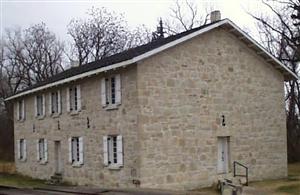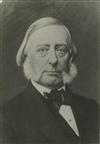 Description: Inside you will find exhibits describing the struggle between pro-slavery and free-state supporters that took place in the Kansas Territory during the latter half of the 1850s.
Description: Inside you will find exhibits describing the struggle between pro-slavery and free-state supporters that took place in the Kansas Territory during the latter half of the 1850s.We have made this an optional tour stop because it will add about 122 miles to the length of the tour.
Directions: The First Territorial Capitol of Kansas [ Waypoint = N39 05.108 W96 45.735 ] is located in Building #693 on Huebner Road on the Fort Riley Military Reservation near Junction City, Kansas 66441. Note: You will be entering a U.S. Army Military Reservation. All visitors are required to present a photo ID, car insurance papers, and registration.
 Description: Inside you will find exhibits describing the struggle between pro-slavery and free-state supporters that took place in the Kansas Territory during the latter half of the 1850s.
Description: Inside you will find exhibits describing the struggle between pro-slavery and free-state supporters that took place in the Kansas Territory during the latter half of the 1850s.
The first legislative elections were held in the Kansas Territory on March 30, 1855. Led by David Rice Atchison and Benjamin Stringfellow, thousands of Missourians crossed the border on election day to vote for pro-slavery candidates. Thirty-four out of the 35 seats were won by pro-slavery candidates. Although Territorial Governor Reeder would invalidate a small number of the election results, the First Kansas Territorial Legislature would meet on July 2, 1855 in Pawnee, Kansas (near present day Fort Riley, Kansas 66442). Free-state leaders branded them “The Bogus Legislature.”
 Kansas Territorial Governor Andrew Reeder had selected Pawnee as the Territorial Capital, in part, because he wanted to minimize the influence of neighboring Missourians. He also had a financial interest in property there. Pawnee was located 150 miles west of the Missouri border. The pro-slavery legislature wanted to be closer to the Missouri border and voted to move the capital to the Shawnee Methodist Mission. Governor Reeder vetoed the legislation but his veto was overridden. The legislature adjourned on July 6th and reconvened at the Shawnee Methodist Mission on July 16th.
Kansas Territorial Governor Andrew Reeder had selected Pawnee as the Territorial Capital, in part, because he wanted to minimize the influence of neighboring Missourians. He also had a financial interest in property there. Pawnee was located 150 miles west of the Missouri border. The pro-slavery legislature wanted to be closer to the Missouri border and voted to move the capital to the Shawnee Methodist Mission. Governor Reeder vetoed the legislation but his veto was overridden. The legislature adjourned on July 6th and reconvened at the Shawnee Methodist Mission on July 16th.
Having been neglected over the years, the Kansas State Historical Society joined forces with the Kansas Legislature and Union Pacific Railway to restore the structure during the 1920s. Today the building is maintained by the Kansas State Historical Society and Friends of the First Territorial Capitol.